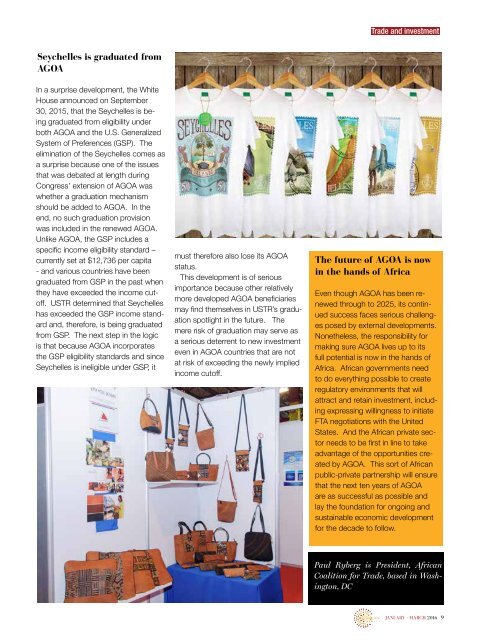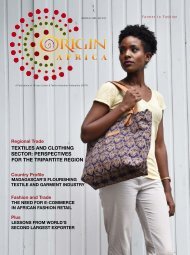You also want an ePaper? Increase the reach of your titles
YUMPU automatically turns print PDFs into web optimized ePapers that Google loves.
Trade and investment<br />
Seychelles is graduated from<br />
AGOA<br />
In a surprise development, the White<br />
House announced on September<br />
30, 2015, that the Seychelles is being<br />
graduated from eligibility under<br />
both AGOA and the U.S. Generalized<br />
System of Preferences (GSP). The<br />
elimination of the Seychelles comes as<br />
a surprise because one of the issues<br />
that was debated at length during<br />
Congress’ extension of AGOA was<br />
whether a graduation mechanism<br />
should be added to AGOA. In the<br />
end, no such graduation provision<br />
was included in the renewed AGOA.<br />
Unlike AGOA, the GSP includes a<br />
specific income eligibility standard –<br />
currently set at $12,736 per capita<br />
- and various countries have been<br />
graduated from GSP in the past when<br />
they have exceeded the income cutoff.<br />
USTR determined that Seychelles<br />
has exceeded the GSP income standard<br />
and, therefore, is being graduated<br />
from GSP. The next step in the logic<br />
is that because AGOA incorporates<br />
the GSP eligibility standards and since<br />
Seychelles is ineligible under GSP, it<br />
must therefore also lose its AGOA<br />
status.<br />
This development is of serious<br />
importance because other relatively<br />
more developed AGOA beneficiaries<br />
may find themselves in USTR’s graduation<br />
spotlight in the future. The<br />
mere risk of graduation may serve as<br />
a serious deterrent to new investment<br />
even in AGOA countries that are not<br />
at risk of exceeding the newly implied<br />
income cutoff.<br />
The future of AGOA is now<br />
in the hands of <strong>Africa</strong><br />
Even though AGOA has been renewed<br />
through to 2025, its continued<br />
success faces serious challenges<br />
posed by external developments.<br />
Nonetheless, the responsibility for<br />
making sure AGOA lives up to its<br />
full potential is now in the hands of<br />
<strong>Africa</strong>. <strong>Africa</strong>n governments need<br />
to do everything possible to create<br />
regulatory environments that will<br />
attract and retain investment, including<br />
expressing willingness to initiate<br />
FTA negotiations with the United<br />
States. And the <strong>Africa</strong>n private sector<br />
needs to be first in line to take<br />
advantage of the opportunities created<br />
by AGOA. This sort of <strong>Africa</strong>n<br />
public-private partnership will ensure<br />
that the next ten years of AGOA<br />
are as successful as possible and<br />
lay the foundation for ongoing and<br />
sustainable economic development<br />
for the decade to follow.<br />
Paul Ryberg is President, <strong>Africa</strong>n<br />
Coalition for Trade, based in Washington,<br />
DC<br />
JANUARY - MARCH 2016 9



